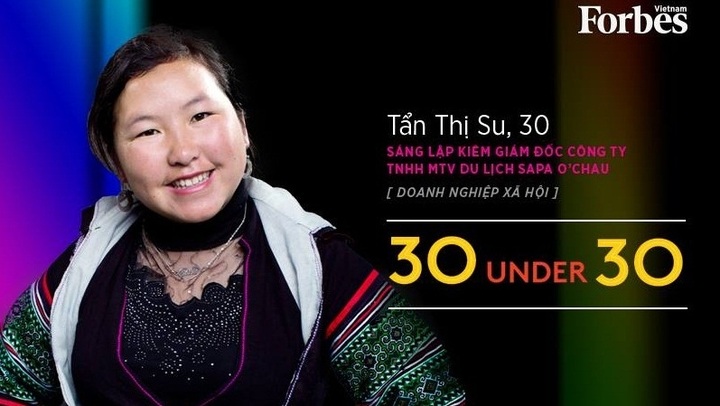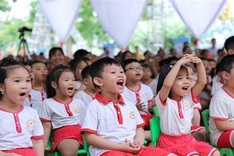
Founder and director of the travel company Sapa Limited O'Chau, Tan Thi Su
In both Vietnamese, English and sometimes H’mong language, the girl from Lao Cai province shared her life story, in which she recalled her hard childhood, and her determination to change her life and inspire ethnic children to follow their dreams.A poor girl pursuess a life dream
Su was born into a poor H’Mong family in Lao Chai commune, Sapa district living in a small house with a straw and corn leaf roof. Her father got sick frequently, forcing his wife and children to shoulder a lot of the responsibility in the house. Su’s parents have four daughters, so from a very early age, Su was, helping her parents tend to the buffaloes and feed the pigs.
She recalled that her district started drawing interest from foreign visitors when she was a third grader. Her sister followed the old women in the village to sell souvenirs to visitors, leaving her at home to do the house chores. The family was so poor that the children did not have rice for meals, so the family members looked forward to her sister bringing home cans of maize powder cakes. In the heavy rain, the house leaked and made them wet, leaving Su feeling miserable.
The family’s difficult economic status forced Su to drop out of school, following her sister to sell souvenirs. The work was not easy; sometimes the two little girls didn’t sell anything at all for two or three days. They knew no English at all, causing them a lot of difficulties in communicating and advertising their products to foreign visitors. With an empty stomach, Su joined other ethnic minority children struggling with each other to sell products to tourists. Su had to walk 10 kilometres every day and often returned home late when it was pitch black.
Su witnessed many children like her, quitting school, wandering the streets to earn a living and having no idea about their future. H’mong girls and women follow a traditional life and are the main workforce in the family. Only children from rich families have access to education and many H’Mong people have to work very hard for their family.
“I haven’t seen anyone carry as many heavy things on their back as H’mong women. If I didn’t receive an education, my life would be trapped in a cycle like theirs: working hard through gloomy days, giving birth to a flock of children, and carrying so many heavy things on my back. I was scared of this,” Su said.
“What should I do to make myself different? What should I do to change my life?” The two questions continuously echoed in Su’s mind.

Foreign visitors enjoyed their tour provided by Sapa O'Chau (Photo: Sapa O'Chau)
She realised the key to change was learning English so she decided to learn English from foreign tourists. In the early 2000s, the tourists were very friendly to local ethnic children and willing to teach them some simple phrases and sentences for communication.
Patiently learning single words every day, Su bravely spoke in longer sentences and asked for help from foreigners. However, she was aware that she could only speak broken English, so she wanted to learn the language more methodically. That was why after a long working day, Su went to an internet café in town to learn English. At that time, users had to pay a lot to get access to the Internet, so many people assumed that Su was a gaming addict.
Then Su applied for a job as a dish washer at a local restaurant to enrich her vocabulary. When she was confident enough, she quit the job and then started working as a tour guide.
Sapa O’Chau and global citizen Tan Thi Su
As a tour guide, Su introduced her foreign guests to the beautiful landscapes and indigenous specialities of her hometown. She knew exactly what tourists wanted to explore in Sapa, but tourism services at that time couldn’t meet their demand. She came up with an idea of starting a tourism facility run by local people, providing the best services for holidaymakers.
With the support of her Australian friends, Sapa O’Chau was established in 2007, with O’Chau in H’Mong language means “hello”. It is the first tourist facility run by H’mong people in Lao Chai Commune under the community tourism model. Su always bears in mind that the company’s top priority is to create jobs and learning opportunities for local children.
Guests participating in the tours from Sapa O’Chau are not only visiting, but also teaching at a profession or a language for free to the local children.
However, the fierce competitiveness in the tourism market in Sapa did not make it easy for Su - a young girl lacking management experiences and capital - to run her fledging enterprise. The company was even pushed to the verge of bankruptcy several times.
Fortune smiled on Su in 2001 when she found a project on improving the development of social enterprise in Vietnam, co-implemented by the Centre for Social Initiatives Promotion (CSIP) and the KOTO Foundation and Social Enterprise under the sponsor of the Irish Development Agency with technical support from the Vietnam Chamber of Commerce and Industry (VCCI).
As the Sapa O’Chau model was highly appreciated by the CSIP, Su received training in leadership and management as well as improved her organisation and human resources skills. Brining learning to life, Su made proper adjustments to her company, making it more professional, resulting in encouraging progress with increased revenue.
Su then opened a branch of Sapa O’Chau in Hanoi, of which staff members are H’mong girls fluent in English. They used to be street vendors swarming around tourists in Sapa, but now have a chance to change their lives thanks to Su’s help.
Su also established the Sapa O’Chau School, where children are taught the skills and knowledge to be a tour guide for free. From the school, many children continue their studies at colleges and universities and find good jobs.
“I want to change the conception that it is useless for a H’mong girl to receive an education because she will then have to get married and work in the fields. I’m concerned that H’mong women get married at very early age because of the tradition of early marriage, then work all day but still live in poverty,” Su said.
After more than eight years, Sapa O’Chau has evolved from a charity tourism business into a business that trades beverages and brocades in Sapa. The poor little girl is now a global citizen with busy working schedule.
There is no final destination in Su’s journey; but many ethnic children are following her steps and are inspired by her life story. “I want them to look at me and learn that Su was a poor girl who dropped out of school to sell souvenirs, but Su can do it, so they can do it also,” Su declared.




















